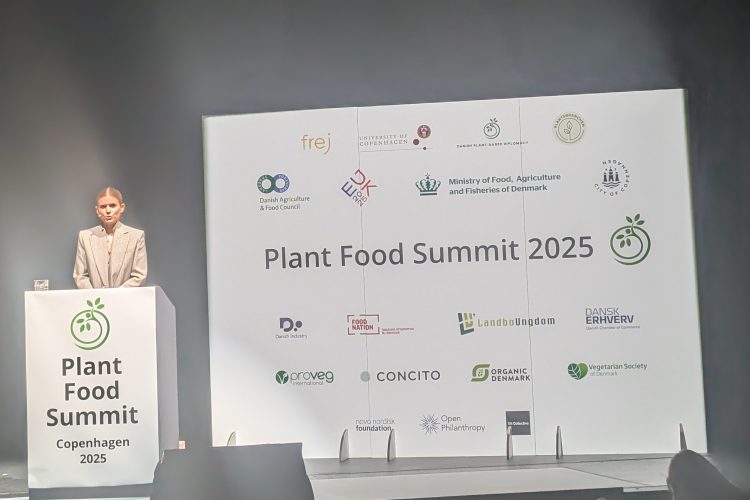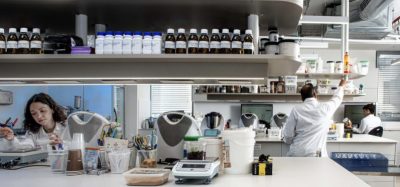Denmark shows the way: why the UK’s food strategy must prioritise plants
Posted: 3 November 2025 | Jenny Canham | No comments yet
Reflecting on the UK’s opportunity to reinvigorate the health of its food industry, Jenny Canham shares the inspirational progress that Denmark has made in switching its focus to plant-based.


Keynote speaker, actor and environmental advocate Kate Mara speaking at the Plant Food Summit in Copenhagen. Credit: Jenny Canham
The Plant Food Summit in Copenhagen was a masterclass in how governments can lead the transition to more sustainable, resilient food systems. An official event of the Danish Presidency of the Council of the European Union, the summit brought together ministers, farmers, researchers and NGOs from across Europe, all committed to accelerating the shift towards plant-rich diets. As the UK prepares its new national food strategy, due next spring, we have a lot to learn from Denmark’s joined-up, pragmatic and forward-looking plant-based approach.
Background to the Summit
The Government’s approach centres on funding and incentives. By supporting farmers to experiment, by helping them create new markets, Denmark is proving that plant-based innovation can be a business opportunity, not a threat.”
Denmark has the highest animal production per capita in the world, yet it has taken remarkable steps towards integrating more plant-based foods into its national food system. This progress was achieved through collaboration among politicians, farmers, businesses and NGOs, who united around the positive common goal of promoting plant-based foods rather than solely reducing animal-based production.
In November 2024, the Vegetarian Society hosted a parliamentary reception to present Denmark’s Action Plan for Plant-Based Foods. This initiative exemplifies how to build a healthier, more sustainable and plant-forward future. The purpose of the event was to explore how Denmark achieved this success and to share valuable lessons for other nations striving towards similar progress.
A Government that uses the power of plants
Denmark’s food policy is not just about cutting emissions, it’s about creating a strong, self-sufficient nation that prioritises health and boosts economy at the same time. Jacob Jensen, Danish Minister for Food, Agriculture and Fisheries, opened the summit by setting out three clear goals for the future of Denmark:
- Increase plant-based production and consumption
- Improve land efficiency – achieving cleaner water, cleaner air and greater biodiversity
- Strengthen domestic food security through resilient local supply chains.
These goals form part of a concrete, government-backed plant-based roadmap, supported by investment in research, innovation and farmer transition schemes. The logic is simple: if you build the right infrastructure, advisory networks and incentives, the market will follow.
Collaboration over polarisation
Having attended the summit, a recurring theme was the collaborative culture that underpins Denmark’s success. Several speakers, from the CEO of Organic Denmark to the Vice President of the Danish Agriculture and Food Council, emphasised the power of dialogue, particularly in areas of disagreement, promoting the value of focusing on what moves us forwards rather than what divides us.
Where once the green transition was seen as a clash between environmentalists and farmers, Denmark has deliberately changed that narrative. As Marie-Louise Boisen Lendal, Director of Think Tank Frej and a farmer’s daughter herself, put it:
“Farmers aren’t the obstacle to the green transition – they’re the key to it.”
The summit showcased how bridging rural and urban divides, listening across differences and focusing on shared goals – like healthier diets, cleaner environments and stronger local economies – creates the trust needed for genuine change.
“Use the carrot, not the stick,” was a message echoed repeatedly. The Government’s approach centres on funding and incentives. By supporting farmers to experiment, by helping them create new markets, Denmark is proving that plant-based innovation can be a business opportunity, not a threat.
What makes Denmark’s model work
Pinpointing the key factors that have driven Denmark’s success, several key ingredients stand out:
- Synergy between government departments, with food, environment, health and trade all moving in the same direction
- Significant public investment in research and innovation, from plant breeding to alternative protein technologies
- Support for farmers through advisory services, financial incentives and risk-sharing mechanisms
- EU cooperation – Danish leaders called for a Europe-wide plant-based food strategy to accelerate investment and knowledge-sharing.
There is a powerful sense of unity in the leadership of the plant-based strategy in Denmark. The ‘land of farming’ isn’t abandoning its agricultural identity, it’s redefining it for the future.
On the ground: farmers leading the transition
I was fortunate enough to visit a pig farm-turned plant-based farm, Bælgkompagniet, that summed up what this change looks like in action. For nine generations the family had raised pigs – 60,000 a year. But in 2018, they decided to go organic and eventually switch to legume cultivation, with rotations of legumes including lentils, oats, barley and fava beans.
Their motivation was both ethical and economic: Denmark imports most of its lentils and domestic demand far outstrips supply. They are now supplying legumes to restaurants and supermarkets, demonstrating how the right market signals and consumer demand can drive rapid transformation.
I was curious as to how we can work to support more farms to make this transition, given that Bælgkompagniet is currently taking a brave step that most farmers are sceptical about following. The answer? Increase demand. Farmers need to know this is a safe business model; one that is economically viable. To support this transition it is therefore essential to increase consumption of legumes to ensure demand and a secure market. As one of the farmers said:
“If people eat more legumes, farmers will grow them. Demand is everything.”
Lessons for the UK
The UK’s forthcoming food strategy offers an opportunity to realign its food system with climate, health and animal welfare goals. To seize that opportunity, policymakers should take inspiration from Denmark’s example and:
- set clear targets to increase plant-based consumption and domestic crop production
- fund farmer transition through investment, incentives and advisory support
- integrate departments – ensuring DEFRA, DHSC and DfE work together to align policy, procurement and education
- lead with dialogue, not division – bringing farmers, scientists and citizens into a shared conversation about the future of food.
As Fabrice DeClerck, Chief Science Officer at EAT, reminded us at the summit, “those of us over-consuming food are impinging on the rights of others.” The planetary health diet is not just about what’s on our plates; it’s about fairness, security and the sustainability of life itself.
And as keynote speaker Kate Mara, actress and environmental advocate, so eloquently put it: “The Action Plan is a guidepost for other countries to follow and many, many are listening. History has shown us that when people unite around principle, they are unstoppable.”
Denmark’s journey shows what is possible when government leads with trust, evidence and collaboration. The UK now has a chance to do the same; to make plant-based food a national priority.
If we get this right, we can strengthen our economy, restore nature and ensure that every meal contributes to a fairer, healthier and more sustainable world.
Meet the author


Jenny Canham is a writer and animal advocate with a background in journalism and public affairs. Her work has appeared in various media including BBC News, The Independent and The Daily Mirror. As Public Affairs Lead at the Vegetarian Society, she campaigns for stronger legal protections for animals and more sustainable food systems. With over a decade in global animal protection, Jenny uses storytelling and policy engagement to raise awareness and drive meaningful change worldwide.
Related topics
Environment, Food Security, Health & Nutrition, Plant based, Regulation & Legislation, Supply chain, Sustainability, The consumer, Trade & Economy, World Food









